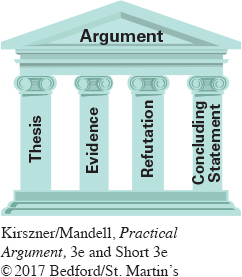Suleiman, More Than “Moral Complicity” at Auschwitz
EXERCISE 16.6
The following essay includes the basic elements of an ethical argument. Read the essay, and then answer the questions that follow it, consulting “Structuring an Ethical Argument” if necessary.
This essay was published in the Wall Street Journal on April 29, 2015.
MORE THAN “MORAL COMPLICITY” AT AUSCHWITZ
DANIEL SULEIMAN
1
On the opening day of his criminal trial in Lüneburg, Germany, on April 21 for complicity in the deaths of approximately 300,000 Jews, most of whom were Hungarian, former Waffen-
2
“It is without question that I am morally complicit in the murder of millions of Jews through my activities at Auschwitz,” he told the court, according to the Guardian. “But as to the question whether I am criminally culpable, that’s for you to decide.”
3
Mr. Gröning’s strategy of conceding one battle in an attempt to win a more important one is a common criminal-
4
On the first day of the guilt phase of his trial, Tsarnaev’s lawyer admitted that Tsarnaev and his brother were responsible for the bombings and the murder of a university police officer. Why? Because by handing the government a victory in the guilt phase, Tsarnaev hopes to strengthen his argument, being made in the sentencing phase, that he should be spared the death penalty.1
5
Sometimes this strategy works. But sometimes it is merely all a defendant has. Should Mr. Gröning’s concession that he bears moral responsibility for the deaths at Auschwitz spare him a guilty verdict?
6
The short answer is no. There are clearly situations in which moral failings do not, and should not, equate with criminal guilt. Adultery is commonly considered a moral failure in the U.S., but Americans are no longer prosecuted for it. Doing nothing while a neighbor’s house burns to the ground could result in feelings of moral guilt, but it is almost certainly not a crime. In an example closer to Mr. Gröning’s situation, someone who refused to hide a friend or neighbor as the Jews were being rounded up in Budapest might feel “morally complicit” in their subsequent deaths, but we would not consider him criminally responsible.
Page 606
7
Let us assume the facts are as Mr. Gröning contends—
8
“So is he also guilty of crimes?”
So is he also guilty of crimes? The camps were not his idea. He didn’t, as far as we know, deliver anyone to the gas chamber. Maybe he even privately came to reject Nazi ideology.
9
I recognize that my judgment might be clouded by the fact that my mother, who was born in Budapest in 1939, could have been one of Oskar Gröning’s victims, had she and her parents not survived the war under assumed identities. Or because other members of my family did perish in concentration camps, perhaps while Mr. Gröning looked on. Yet I am trained to examine legal questions analytically and, as a purely legal matter, I do not accept Mr. Gröning’s argument, for it finds no support in common concepts of criminal law.
10
By way of example, every day across the U.S., defendants are indicted for aiding and abetting others in the commission of their crimes, or serving as an accomplice, or participating with others in a criminal enterprise. These concepts are basic, and elastic. If I abhor bank robbery, but I nevertheless drive you to a local bank, where, dressed in a mask with a gun in your hand, you get out and rob the bank, you and I have both committed crimes. If I help route phone calls to a network of drug dealers, but never touch the stuff, I am still a criminal.
11
And if I strip Holocaust victims on their way to the gas chamber of their last coins, because, as Mr. Gröning testified, “they didn’t need it anymore,” I am guilty. I am an accomplice to murder, a participant in a criminal enterprise. Caught up in activities of others’ design, perhaps, but guilty nonetheless.
12
Ninety-
Page 607

Identifying the Elements of an Ethical Argument
Look up the definition of complicity. What does Gröning mean when he says, “I am morally complicit in the murder of millions of Jews” (para. 2)?
What ethical principle does Suleiman apply in his essay? At what point in the essay does he state this principle? Why do you think he states it where he does?
What is the thesis of this essay? In your own words, write it on the lines in the template below.
Despite his admission of moral guilt,
According to Suleiman, what is the difference between moral guilt and legal guilt? Is it possible for a person to be morally complicit in murder but not criminally culpable? Explain.
Where in the essay does Suleiman discuss possible objections to his thesis? Where does he concede that he may be biased? How effectively does he address these issues?
What examples does Suleiman use to support his thesis? What other kinds of support could he have also used? Should he have used other support? Explain.
In his essay, Suleiman employs all three appeals—
logos, pathos, and ethos. Locate examples of each. How effective is each appeal? Explain. What ideas does Suleiman emphasize in his conclusion? Do you think that his conclusion is effective? Explain.